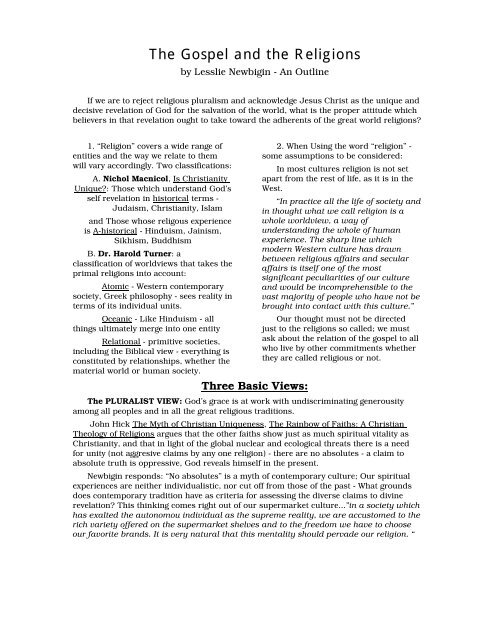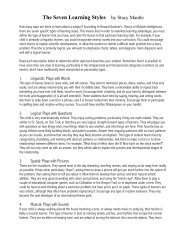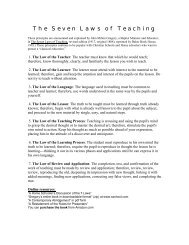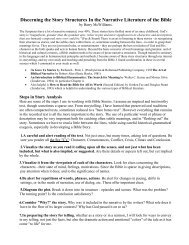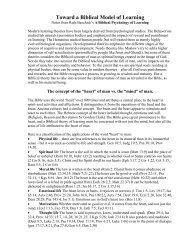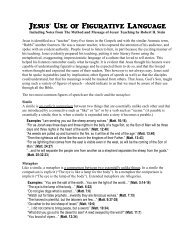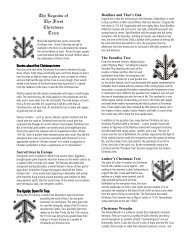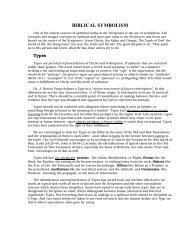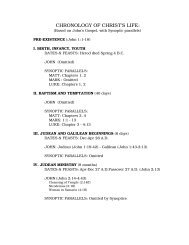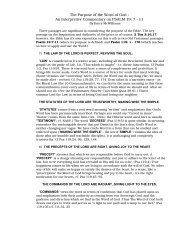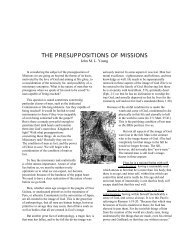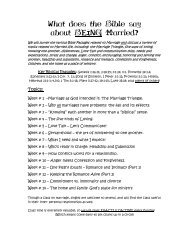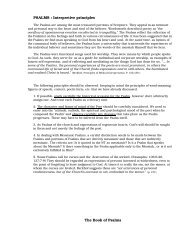On Multiculturalism, Pluralism and Dialogue - Eldrbarry's Story ...
On Multiculturalism, Pluralism and Dialogue - Eldrbarry's Story ...
On Multiculturalism, Pluralism and Dialogue - Eldrbarry's Story ...
Create successful ePaper yourself
Turn your PDF publications into a flip-book with our unique Google optimized e-Paper software.
The Gospel <strong>and</strong> the Religions<br />
by Lesslie Newbigin - An Outline<br />
If we are to reject religious pluralism <strong>and</strong> acknowledge Jesus Christ as the unique <strong>and</strong><br />
decisive revelation of God for the salvation of the world, what is the proper attitude which<br />
believers in that revelation ought to take toward the adherents of the great world religions?<br />
1. “Religion” covers a wide range of<br />
entities <strong>and</strong> the way we relate to them<br />
will vary accordingly. Two classifications:<br />
A. Nichol Macnicol, Is Christianity<br />
Unique?: Those which underst<strong>and</strong> God’s<br />
self revelation in historical terms -<br />
Judaism, Christianity, Islam<br />
<strong>and</strong> Those whose religous experience<br />
is A-historical - Hinduism, Jainism,<br />
Sikhism, Buddhism<br />
B. Dr. Harold Turner: a<br />
classification of worldviews that takes the<br />
primal religions into account:<br />
Atomic - Western contemporary<br />
society, Greek philosophy - sees reality in<br />
terms of its individual units.<br />
Oceanic - Like Hinduism - all<br />
things ultimately merge into one entity<br />
Relational - primitive societies,<br />
including the Biblical view - everything is<br />
constituted by relationships, whether the<br />
material world or human society.<br />
Three Basic Views:<br />
2. When Using the word “religion” -<br />
some assumptions to be considered:<br />
In most cultures religion is not set<br />
apart from the rest of life, as it is in the<br />
West.<br />
“In practice all the life of society <strong>and</strong><br />
in thought what we call religion is a<br />
whole worldview, a way of<br />
underst<strong>and</strong>ing the whole of human<br />
experience. The sharp line which<br />
modern Western culture has drawn<br />
between religious affairs <strong>and</strong> secular<br />
affairs is itself one of the most<br />
significant peculiarities of our culture<br />
<strong>and</strong> would be incomprehensible to the<br />
vast majority of people who have not be<br />
brought into contact with this culture.”<br />
Our thought must not be directed<br />
just to the religions so called; we must<br />
ask about the relation of the gospel to all<br />
who live by other commitments whether<br />
they are called religious or not.<br />
The PLURALIST VIEW: God’s grace is at work with undiscriminating generousity<br />
among all peoples <strong>and</strong> in all the great religious traditions.<br />
John Hick The Myth of Christian Uniqueness, The Rainbow of Faiths: A Christian<br />
Theology of Religions argues that the other faiths show just as much spiritual vitality as<br />
Christianity, <strong>and</strong> that in light of the global nuclear <strong>and</strong> ecological threats there is a need<br />
for unity (not aggresive claims by any one religion) - there are no absolutes - a claim to<br />
absolute truth is oppressive, God reveals himself in the present.<br />
Newbigin responds: “No absolutes” is a myth of contemporary culture; Our spiritual<br />
experiences are neither individualistic, nor cut off from those of the past - What grounds<br />
does contemporary tradition have as criteria for assessing the diverse claims to divine<br />
revelation? This thinking comes right out of our supermarket culture...”in a society which<br />
has exalted the autonomou individual as the supreme reality, we are accustomed to the<br />
rich variety offered on the supermarket shelves <strong>and</strong> to the freedom we have to choose<br />
our favorite br<strong>and</strong>s. It is very natural that this mentality should pervade our religion. “
“There is no dichotemy between the inward experiences of the heart <strong>and</strong> the<br />
outward history . . . the Spirit leads us into fuller underst<strong>and</strong>ing of God’s self-revelation<br />
in Jesus . . . it is not a matter of our own individual subjectivity.”<br />
The EXCLUSIVIST VIEW: holds that all who do not accept Jesus as Lord <strong>and</strong> Savior<br />
are eternally lost. It is through Jesus Christ that God is reconciling the world.<br />
The INCLUSIVIST VIEW: acknowledges Christ as the only Savior, but affirm that his<br />
saving work extends beyond the bounds of the visible church, non-Christians can be saved<br />
- <strong>and</strong> non-Christian religions have a salvific role.<br />
Karl Radner: has four reasons for taking this view: God’s relation to those who lived<br />
before the incarnation occurred or was brought to their knowledge. Non-Christian<br />
religions are lawful <strong>and</strong> salvific until the gospel is brought to the attention of their<br />
adherents. Non-Christians who faithfully practice their religion can be saved, but the one<br />
who accepts Christ has a better chance of being saved. (This view is widely accepted by<br />
contemporary culture). The other religions will not be displaced by Christianity - pluralism<br />
will continue <strong>and</strong> conflict will get sharper.<br />
The Triune God’s love <strong>and</strong> grace reaches<br />
out to every creature. There is not person, of<br />
whatever kind or creed without some witness<br />
of God’s grace in heart <strong>and</strong> conscience <strong>and</strong><br />
reason. We must begin here. “But the same<br />
revelation in Jesus Christ compels us to<br />
acknowledge that this world which God made<br />
<strong>and</strong> loves is in a state of alienation, rejection<br />
<strong>and</strong> rebellion against him. Calvary is the<br />
central unveiling of the infinite love of God <strong>and</strong><br />
at the same time the unmasking of the dark<br />
horror of sin.” All true thinking must be held<br />
between these two “poles.”<br />
“The Christian life lived between the two<br />
poles of the amazing grace of God <strong>and</strong> the<br />
appauling sin I share, has a corresponding<br />
synthesis of godly confidence <strong>and</strong> godly fear,<br />
The fear is lest I should put my trust in<br />
anything other than<br />
God’s grace in Jesus<br />
Christ, the confidence is<br />
the infinite abundance<br />
of his grace to me <strong>and</strong><br />
to every one of his<br />
creatures.”<br />
When we slacken the tension between these<br />
it affects our attitudes toward those outside the<br />
household of faith.<br />
A leaning towards Universalism blunts<br />
God’s action in Christ - assuring everyone that<br />
they will be alright in the end - doesn’t take sin<br />
into full account. <strong>On</strong> the other h<strong>and</strong>,<br />
overwhelmed by the abyss of sin, it is a matter<br />
of one in the lifeboat <strong>and</strong> the other drowning -<br />
no place for any kind of dialogue.<br />
The improper question: “Who will be saved<br />
at the end?” fails to take into account that God<br />
alone has the right to give the answer. We<br />
should not prempt the final judgment of God -<br />
even Jesus taught it will be a day of surprises,<br />
revesals, astonishment. For anyone who has<br />
understood what God did for us<br />
all in Jesus Christ, the one<br />
question is: “How shall God be<br />
glorified?” We begin with the<br />
mighty work of grace in Jesus<br />
Christ <strong>and</strong> ask how is he to be<br />
honored <strong>and</strong> glorified.
<strong>On</strong> <strong>Dialogue</strong><br />
Leslie Newbigin<br />
The Triune God’s love <strong>and</strong> grace reaches out to every creature. There is not person, of<br />
whatever kind or creed without some witness of God’s grace in heart <strong>and</strong> conscience <strong>and</strong> reason.<br />
We must begin there. “But the same revelation in Jesus Christ compels us to acknowledge that<br />
this world which God made <strong>and</strong> loves is in a state of alienation, rejection <strong>and</strong> rebellion against<br />
him. Calvary is the central unveiling of the infinite love of God <strong>and</strong> at the same time the<br />
unmasking of the dark horror of sin.”<br />
A leaning towards Universalism blunts God’s action in Christ - assuring everyone that they will<br />
be all right in the end - doesn’t take sin into full account. <strong>On</strong> the other h<strong>and</strong>, overwhelmed by the<br />
abyss of sin, if it is a matter of one in the lifeboat <strong>and</strong> the other drowning - there is no place for<br />
any kind of dialogue. The improper question: “Who will be saved at the end?” fails to take into<br />
account that God alone has the right to give the answer. For anyone who has understood what<br />
God did for us all in Jesus Christ, the one question is: “How shall God be glorified?” We begin<br />
with the mighty work of grace in Jesus Christ <strong>and</strong> ask how is He to be honored <strong>and</strong> glorified.<br />
• Christians should expect, look for <strong>and</strong> welcome all the signs of grace at work<br />
in the lives of those who do not know Jesus as Lord.<br />
“In our contact with people who do not acknowledge Jesus as Lord, our first business,<br />
our first privilege, is to seek out <strong>and</strong> welcome all the reflections of that one true light in<br />
the lives of those we meet.”<br />
• Christians should be eager to cooperate with people of all faiths <strong>and</strong><br />
ideologies in all projects which are in line with the Christian’s underst<strong>and</strong>ing<br />
of God’s purpose in history.<br />
• As we work together with people of other commitments, we shall discover the<br />
places where our ways must separate. Here is where dialogue begins.<br />
“If we are doing what we ought to be doing as Christians, the dialogue will be initiated<br />
by our partners, not by ourselves. . . They will discover that we are guided by<br />
something more ultimate <strong>and</strong> more immediate than the success of the project at h<strong>and</strong>.<br />
And they will discover that we have resources for coping with failure, defeat,<br />
humiliation, because we underst<strong>and</strong> human history from this side of the resurrection of<br />
the crucified Lord.”<br />
• The essential contribution of the Christian to the dialogue will simply be<br />
telling the story, the story of Jesus, the story of the Bible.<br />
• Finally: “The Christian mission must be an affair of love, not truth. But not a love<br />
that encourages people to believe a lie. It is not true that all roads lead to the top of<br />
the same mountain. There are roads which lead over the precipice. In Christ we have<br />
been shown the road. We cannot treat that knowledge as a private matter for ourselves.<br />
It concerns the whole human family.”<br />
The Gospel in a Pluralist Society pp. 180-182
<strong>On</strong> <strong>Dialogue</strong><br />
Leslie Newbigin<br />
The Triune God’s love <strong>and</strong> grace reaches out to every creature. There<br />
is not person, of whatever kind or creed without some witness of<br />
God’s grace in heart <strong>and</strong> conscience <strong>and</strong> reason. We must begin there.<br />
• Christians should expect, look for <strong>and</strong> welcome all the signs of<br />
grace at work in the lives of those who do not know Jesus as<br />
Lord.<br />
“In our contact with people who do not acknowledge Jesus as Lord, our first<br />
business, our first privilege, is to seek out <strong>and</strong> welcome all the reflections of<br />
that one true light in the lives of those we meet.”<br />
• Christians should be eager to cooperate with people of all faiths<br />
<strong>and</strong> ideologies in all projects which are in line with the<br />
Christian’s underst<strong>and</strong>ing of God’s purpose in history.<br />
• As we work together with people of other commitments, we<br />
shall discover the places where our ways must separate. Here is<br />
where dialogue begins.<br />
“If we are doing what we ought to be doing as Christians, the dialogue will be<br />
initiated by our partners, not by ourselves. . . They will discover that we are<br />
guided by something more ultimate <strong>and</strong> more immediate than the success of<br />
the project at h<strong>and</strong>. And they will discover that we have resources for coping<br />
with failure, defeat, humiliation, because we underst<strong>and</strong> human history from<br />
this side of the resurrection of the crucified Lord.”<br />
• The essential contribution of the Christian to the dialogue will<br />
simply be telling the story, the story of Jesus, the story of the<br />
Bible.<br />
Finally: “The Christian mission must be an affair of love, not truth.<br />
But not a love that encourages people to believe a lie. It is not true<br />
that all roads lead to the top of the same mountain. There are roads which lead<br />
over the precipice. In Christ we have been shown the road. We cannot treat that<br />
knowledge as a private matter for ourselves. It concerns the whole human<br />
family.” The Gospel in a Pluralist Society pp. 180-182


